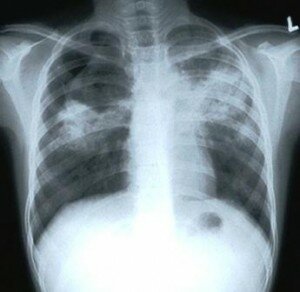Allyn Gaestel| 30 March 2010| MediaGlobal (New York)|
Tuberculosis is worsened by financial and development problems, said Dr. Marcos Espinal, Executive Secretary of the Stop TB partnership, on World TB Day on 24 March. “TB is not a medical problem. It is a development issue. It is an economic problem. It’s a human rights situation.”
Tuberculosis is a curable disease that kills 1.8 million people each year. Nine million people contract the disease annually. With access to medication, it is curable. But many people do not have access and for those that do, a secondary issue can be multi-drug resistant TB (MDR-TB). MDR-TB occurs when patients develop resistance to first line TB drugs. TB medication must be taken diligently and regularly for at least six months. The length of treatment and the importance of strict adherence to the regime can be difficult to maintain, and if people are unable to complete the treatment they may develop resistance, which is much more difficult and expensive to treat.
The World Health Organization released its annual report on MDR-TB this month and provided a new global estimate of 440,000 cases of MDR-TB. This is the highest reported number of cases since 2006 when MDR-TB was defined. This is in part because of increased data access. But the findings are nonetheless worrisome given that TB and MDR-TB can be mitigated given proper health systems and funding.
There is currently no fully effective vaccine against TB. Bacille Calmette Guerin (BCG) is a vaccine that is still used for children who have been exposed to the bacteria to avoid contracting disseminated forms of TB. But the vaccine is dated; it was first used in 1921 and it is not effective for adults. The best prevention method is quick diagnosis and access to treatment for all TB patients.
Dr Mario Raviglione, director of the Stop TB department at WHO, described to MediaGlobal the WHO’s global prevention strategy: “If you have a proper TB control program, you diagnose any case of TB. You diagnose all the cases as quickly as possible. By doing so you put the patients on treatment and you cap their transmissibility”
Diagnosing MDR-TB requires laboratories to be technically equipped to do rapid testing. Technology currently exists to provide test results in a matter of days, a procedure that used to take two months. While this technology is in use in developed countries, low-income countries often do not have this capacity. So WHO, along with several global partners and funding from UNITAID has created the EXPAND-TB program to increase the diagnostic capabilities of 27 developing countries. Raviglione explained to MediaGlobal, “We felt that laboratories are the weak link in TB control and particularly MDR-TB. Without laboratories we cannot make the diagnosis of MDR-TB.” So, he continued, the program aims equip developing countries with testing mechanisms that have previously only been available “in the north of the world, in the rich countries.” The lack of essential testing and care for TB patients reflects the economic and development problems that contribute to the epidemic.
Drug access is another issue in the global fight against TB. Once people do have access to testing, they need to take specific drugs regularly, sometimes for two years. Since most cases occur in low-income countries, there is little profitable motivation for drug companies to invest in producing and improving TB drugs. Raviglione described, “The drugs are unfortunately fairly rare drugs, with little interest by the industry in the world to produce them. Nevertheless, we have pushed for many years now to have more drugs available worldwide and to provide free access to these drugs.”
Governments and NGOs can apply for funding from the Green Light Committee (GLC) Initiative, which was created by WHO in 2000 to fund access to TB medication. Once a government or organization is accepted by the GLC, there is still a procurement process during which the drugs are specially ordered and produced by companies primarily located in India and China. In 2009, more than 19,000 patients were enrolled in programs funded by the GLC, but this still only represents a small number of the 440,000 MDR-TB patients worldwide.
WHO emphasizes that countries need to prioritize their own TB programs and provide domestic funding to scale up diagnosis and treatment. Forty-eight of 71 countries that provided complete TB data to WHO had achieved international standards, and where care is available, there is a 60 percent treatment rate for MDR-TB.
Raviglione emphasized the positive findings to MediaGlobal, but aimed to leverage the success stories into motivation for improved TB programs around the world. “There is a positive message out there which is that countries that have done the proper job are managing now to push the MDR-TB down. Which means simply that we have to increase the effort and intensify the effort.” With proper economic commitments and development, the TB epidemic can be controlled and reduced.
Related posts:
- Africa: Genetically Altered Mosquitoes Could Help Fight Dengue Fever MediaGlobal (New York)| 4 March 2010| Last week, the US...
- Bush Better Than Obama On Aids in Africa Kevin J. Kelley| 14 December 2009| The East African Nairobi...
- African Laboratories Use Safer, High Quality Methods to Detect HIV 12/1/2009 | VOA PEPFAR/BD partnership trains lab technicians on latest...
- Transforming Africa’s Infrastructure cameroonwebnews.com | 11/18/2009 | World Bank * A new report,...
- Africa: Report – Bad Roads Slow Continent’s Growth to a Crawl Paul Redfern | 16 November 2009 |AllAfrica.com Nairobi — The...
Related posts brought to you by Yet Another Related Posts Plugin.









